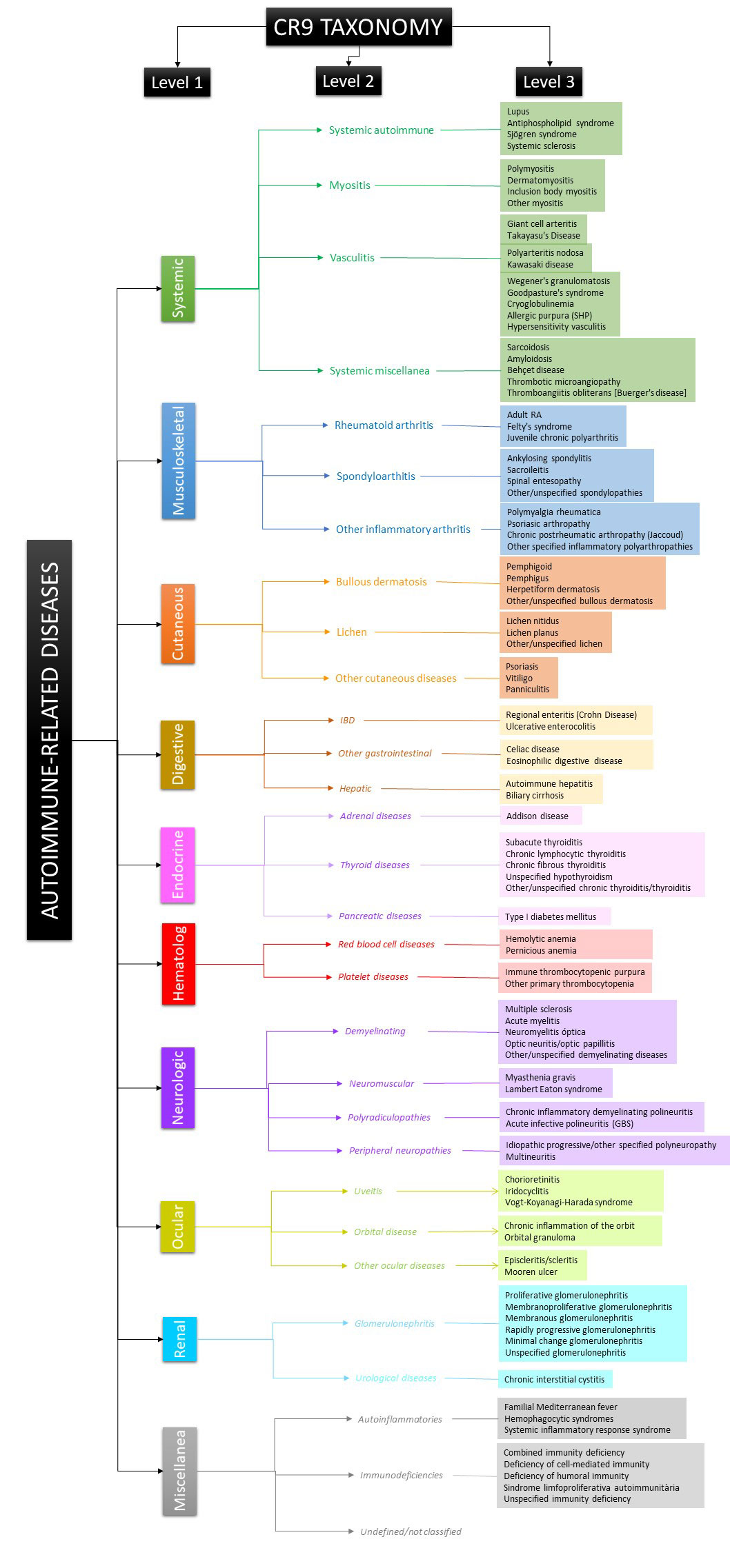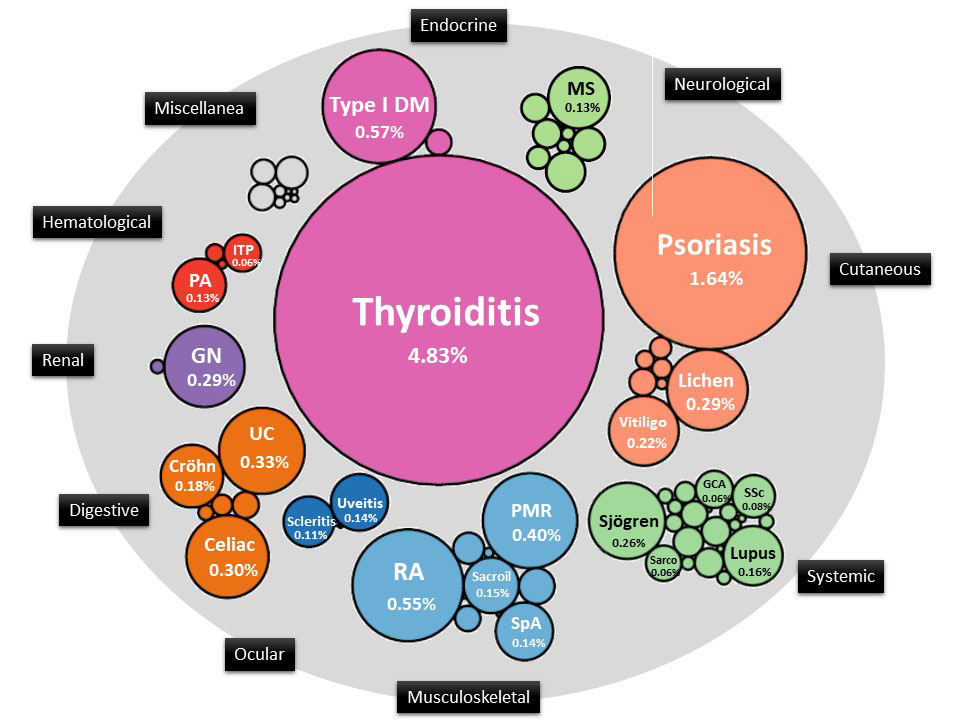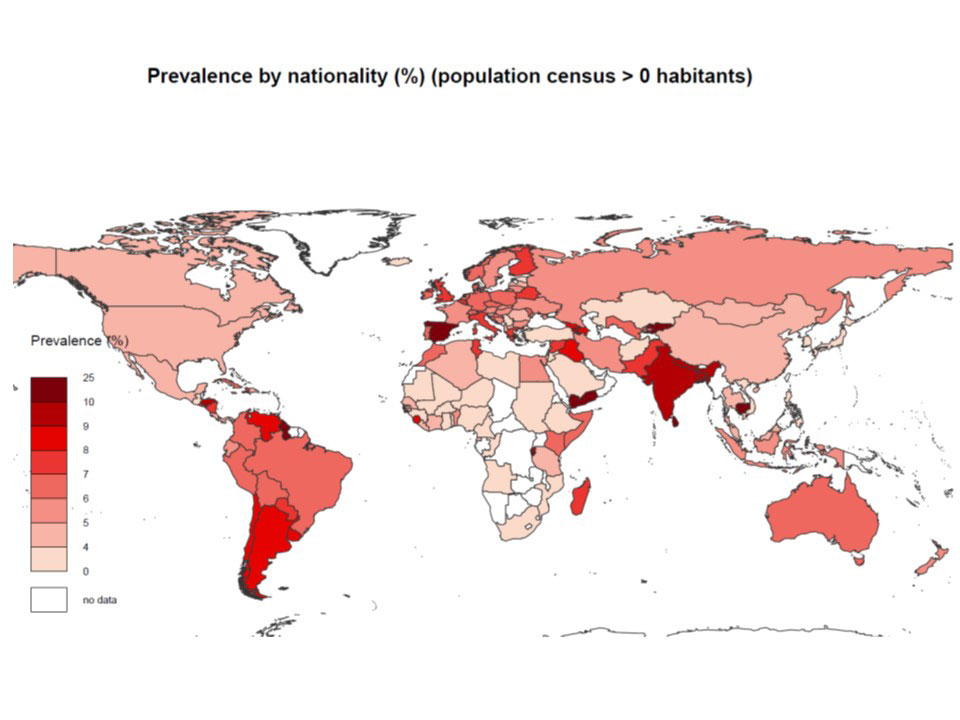Session Information
Date: Tuesday, November 12, 2019
Title: Epidemiology & Public Health Poster III: OA, Gout, & Other Diseases
Session Type: Poster Session (Tuesday)
Session Time: 9:00AM-11:00AM
Background/Purpose: To analyze the prevalence of autoimmune diseases (ADs) in Catalonia, a Mediterranean region with nearly 8 million inhabitants using a public administrative big data program.
Methods: The MASCAT-PADRIS Project was designed in 2017 to take a “high-definition” picture of ADs in Catalonia. Individuals with ≥ 1 ICD-9-CM code for an AD recorded during the study period (January 1st, 2012 – December 31st, 2017) to be included. The prevalence rates were estimated for the main subgroups of ADs after grouping the 234 ICD-9-CM ADs codes into a 3-level taxonomy classification that included 78 individual diseases (Level 3), 28 AD subgroups (Level 2) and 10 main AD groups (Level 1) (Figure 1). We assumed that a patient with an AD will visit a primary care center and/or hospital at least once during the 6-year study period. Therefore, the lifetime prevalence for each individual AD was estimated as the number of individuals with ≥ 1 ICD-9-CM code during the study period divided by the mean number of people with public health coverage in Catalonia during the study period and expressed per 100,000 inhabitants.
Results: A total of 799,003 individuals had a diagnosis of AD during the 2012-2017 study period, representing a prevalence of 10.61%. Among the main individual ADs, 25 (32%) were classified as non-rare diseases (prevalence >5/10,000 inhabitants), 26 (33%) as rare diseases (prevalence 1-5/10,000 inhabitants) and the remaining 27 (35%) as very rare diseases (prevalence < 1/10,000 inhabitants). The 10 main individual ADs with the highest prevalence rates were thyroiditis (4.83%), psoriasis (1.64%), type I diabetes mellitus (1.90%), rheumatoid arthritis (0.58%), polymyalgia rheumatica (0.40%), ulcerative colitis (0.33%), lichen planus (0.31%), celiac disease (0.31%), glomerulonephritis (0.29%) and Sjögren syndrome (0.26%) (Figure 2). Of the 799,003 Catalans with ADs, 531,064 (66.46%) were women, with a female:male ratio of 2:1; only 20 (16 were rare diseases) out of the 78 main ADs (26%) were more frequently reported in men. The ADs most frequently reported in woman were Sjögren syndrome (ratio 6:1) biliary cirrhosis (ratio 5.5) and systemic lupus erythematosus (ratio 4.8:1), while ankylosing spondylitis (ratio 1.7:1), type I diabetes mellitus (1.3:1) and psoriasis (1.3:1) were more frequently reported in men. With respect to the country of birth, a south-to-north gradient of higher frequencies was found. For the main individual ADs, some countries had at least three ADs with a higher prevalence than native-born Catalans (India, Pakistan, Paraguay, Honduras, Morocco and the UK). Some ADs showed a geographically-driven higher prevalence: inflammatory bowel disease and multiple sclerosis in European countries, sarcoidosis in India, Pakistan, Morocco and Paraguay, vitiligo in India, Pakistan, Morocco and all Latin American countries, and thyroiditis in India, Honduras and Argentina (Figure 3).
Conclusion: Autoimmune diseases, although sharing a common etiopathogenic basis, are characterized by wide individual heterogeneity in their frequency, organ-specific phenotype, gender ratio, age predominance and ethnic influence.
To cite this abstract in AMA style:
Retamozo S, Sisó-Almirall A, Kostov B, Martínez-Carbonell E, Brito-Zerón P, Blanch Ramirez P, Acar-Denizli N, Delicado P, González-Martínez S, Velasco Muñoz C, Benavent Àreu J, Ramos-Casals M. The Prevalence of 78 Autoimmune Diseases in Catalonia (MASCAT-PADRIS Big Data Project) [abstract]. Arthritis Rheumatol. 2019; 71 (suppl 10). https://acrabstracts.org/abstract/the-prevalence-of-78-autoimmune-diseases-in-catalonia-mascat-padris-big-data-project/. Accessed .« Back to 2019 ACR/ARP Annual Meeting
ACR Meeting Abstracts - https://acrabstracts.org/abstract/the-prevalence-of-78-autoimmune-diseases-in-catalonia-mascat-padris-big-data-project/



